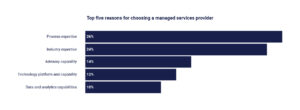Managed services have become integral to companies’ strategies for sustained transformation. In today’s business environment, success hinges on the ability to adapt. Forward-thinking enterprises are leveraging managed services providers not just to stay afloat, but to actively ensure continuous evolution in response to shifting demands.
A recent global survey conducted by KPMG of over 1,000 business leaders underscores this trend, revealing that IT managed services are now a fundamental component of companies’ transformation playbook. It’s revealed that:
IT Managed services have emerged as catalysts for profound shifts in business outcomes. Companies now prioritize providers who offer more than just technological prowess. While cutting-edge technologies remain pivotal, genuine transformation hinges on the seamless integration of human expertise and technology. The goal is not merely technical achievement, but rather substantial advancements in business objectives. What businesses seek are managed services that leverage technology as an enabler but are primarily steered by intelligent strategic insights and comprehensive knowledge across digital, industry-specific, and functional domains.

Executives are making strategic decisions in favor of service providers with demonstrable expertise. This expertise spans specific industries, encompassing an acute understanding of unique business processes and proficiency in harnessing the power of data and analytics. By prioritizing providers with a holistic approach to managed services, businesses position themselves to unlock a new echelon of productivity and innovation, transcending conventional paradigms of technological integration. The transformational potential of IT managed services lies not just in their technical capabilities, but in their ability to strategically align technology with the broader aspirations of the business realm.
Companies are evolving beyond conventional outsourcing practices, moving past mere cost-cutting and labor arbitrage. They now gravitate towards leading providers for high-value, knowledge-intensive processes. This signifies a departure from the usual ‘your mess for less’ back-office model, embracing judgment-intensive tasks across both core and noncore operations. This shift elevates managed services to a strategic level, prompting senior-level involvement. Surprisingly, over half of the respondents affirm that C-level executives dictate this decision, while an additional 17 percent indicate board-level influence. This transition underscores a shift towards prioritizing expertise and strategic value in outsourcing arrangements.
A fresh wave of contemporary services is reshaping the corporate model. IT Managed Services, once confined to operations, have now taken center stage in company strategies. This evolution marks a pivotal shift from traditional practices, transcending mere cost efficiency or technological integration.
The primary goals for adopting managed services encompass accessing cutting-edge technology, achieving cost efficiency, ensuring predictable expenses, tapping into rare expertise, and adopting industry best practices. This approach accelerates innovation, expedites time-to-market, and bolsters stakeholder trust. Additionally, it liberates internal resources for other crucial tasks, fostering a dynamic work environment. Moreover, it aligns with broader strategic imperatives such as operational resilience, growth, agility, and compliance.
The adoption of this model has reached a level of maturity, ushering in an era where businesses are venturing beyond the confines of back-office operations. The objectives now extend far and wide, encompassing critical outcomes like hastened innovation, precise forecasting, adept regulatory risk management, bolstered stakeholder confidence, and nimble adaptation to market shifts. This reimagined approach signifies a progressive leap towards holistic business transformation.
Fueled by a desire for resilience and adaptability, organizations are leveraging managed services as a linchpin for propelling strategic initiatives. In doing so, they not only enhance operational efficacy but also forge a path towards sustainable growth and enduring market relevance. This heralds a new dawn in the corporate world, where modern services emerge as the cornerstone of forward-thinking enterprises.
Unfortunately, mere transformation no longer suffices. Organizations must embrace perpetual evolution to maintain their competitive edge. This imperative has propelled managed services into the forefront of the journey. Yet, operational efficacy will not rest solely on technological prowess. Rather, as illuminated earlier, it will flourish at the crossroads of innovation, expertise, and strategic acumen.
To sustain competitive advantage, organizations must transform continually—which is why managed services have become a key part of the journey. But tomorrow’s most effective operating models won’t be based on tech alone. Instead, as studies suggest, they will thrive at the intersection of innovation, expertise, and strategy.
Drawing upon the proficiency of our Azure Architects, we extend Microsoft Azure migration services along with crafting a robust migration blueprint. This empowers you to sidestep typical migration pitfalls, reduce migration duration, and realize your intended objectives. The synergy between our Azure cloud technology alliance and Charter Global’s seasoned experts enables you to contemporize your infrastructure and accelerate your business expansion.
Speak to our Microsoft Experts today!